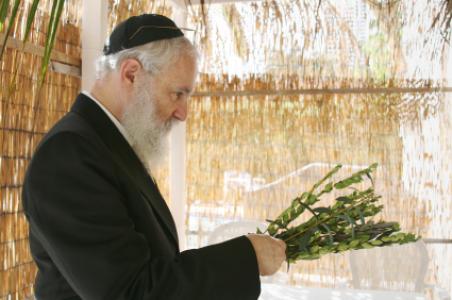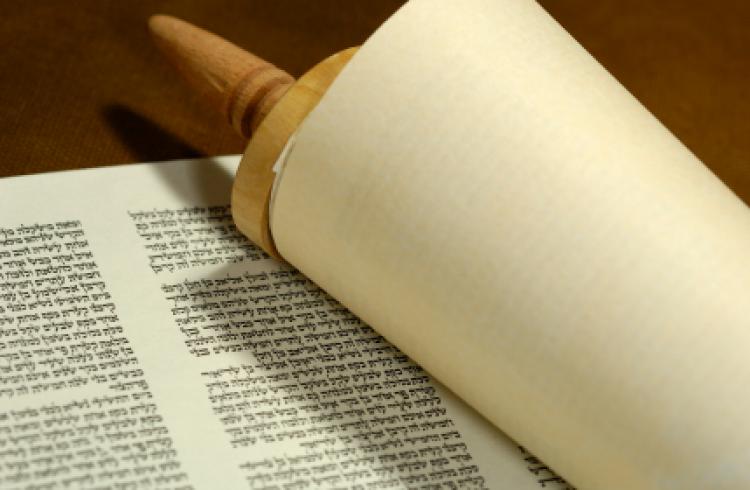
First day of Sukkot
Sukkot is a Jewish holiday lasting 7 days. It begins on the 15th of Tishrei, which falls into September or October.
Jewish communities in the UK celebrate Simchat Torah on the day after Shemini Atzeret to conclude the annual cycle of Torah reading and immediately begin the next cycle.

On Simchat Torah, the annual cycle of Torah readings concludes.
©iStockphoto.com/webking
Simchat Torah immediately follows Shemini Atzeret and the Sukkot festival. In the United Kingdom and all other countries outside of Israel, it is marked on the 23rd day of Tishrei, which is the seventh month of the Jewish calendar. It falls in September or October in the Gregorian calendar.
In Israel, Simchat Torah is observed on the 22nd of Tishrei, on the same day as Shemini Atzeret.
Both Shemini Atzeret and Simchat Torah are Yom Tov, special holidays when Jewish people are prohibited from working and a range of additional restrictions apply. While neither of them is a bank holiday in the UK, Jewish businesses, organizations, and schools are usually closed.
Literally translated as “Joy of the Torah,” Simchat Torah is a day to rejoice and celebrate the Torah, which is the central body of Jewish Holy Scripture. The occasion centers around the conclusion of the annual cycle of weekly Torah readings, and the beginning of the next cycle. In practice, the last portion of the Book of Deuteronomy is read during the morning service, which is immediately followed by the beginning of the Book of Genesis.
Many synagogues in the UK hold parties or celebratory events after the Simchat Torah service.
The Hakafot, usually held on both the eve and the morning of Simchat Torah, is the highlight of the day. During this event, people dance and sing while carrying the Torah scrolls. It usually involves the whole family, including children.
In some Jewish denominations, the person holding the Torah during the Hakafot is thought to act as the feet of the Torah, taking it where it wishes to go, just like the feet transport a person's head. According to this interpretation, this act symbolizes both a person's submission to God and the Torah and the joy afforded by following the Jewish faith.
The United Kingdom is estimated to have the 5th largest Jewish population in the world, with just under 300,000 people practicing the Jewish faith in the country. By far the largest British Jewish community is found in London, followed by those in Manchester and Leeds.
Jewish settlement in England can be traced as far back as the time of the Norman Conquest in 1066. The Jewish community outnumbered the Spanish and Portuguese communities in England by the 18th century.
Many Jewish families in Eastern Europe moved to England to escape persecution and hardship between 1881 and 1914. About 150,000 Jewish people settled in England, with large numbers staying at London's East End during that time. England continued to receive Jewish immigrants escaping persecution around the time of World War II (1939-1945).
In the Jewish diaspora—Jewish communities outside of Israel—an extra day is usually added to religious observances, with the exception of Yom Kippur, which lasts only one day worldwide, and Rosh Hashana, which is celebrated over two days in both Israel and the diaspora.
This custom has its roots in ancient times when the beginning of the months in the Jewish calendar still relied on the sighting of the crescent Moon following a New Moon.
The beginning of a new month was determined by the Sanhedrin, the supreme court of ancient Israel in Jerusalem. Once the date was published, messengers were dispatched to spread the news among Jews living abroad. Since this process took some time, it was decreed that Jews outside of ancient Israel were to observe every holiday for 2 days to make sure that the rules and customs applicable to each holiday were observed on the proper date. This rule is still observed today.
Note: Jewish holidays begin at sundown the day before the date specified for the holiday.
| Year | Weekday | Date | Name | Holiday Type |
|---|---|---|---|---|
| 2019 | Tue | Oct 22 | Simchat Torah | Jewish Holiday |
| 2020 | Sun | Oct 11 | Simchat Torah | Jewish Holiday |
| 2021 | Wed | Sep 29 | Simchat Torah | Jewish Holiday |
| 2022 | Tue | Oct 18 | Simchat Torah | Jewish Holiday |
| 2023 | Sun | Oct 8 | Simchat Torah | Jewish Holiday |
| 2024 | Fri | Oct 25 | Simchat Torah | Jewish Holiday |
| 2025 | Wed | Oct 15 | Simchat Torah | Jewish Holiday |
| 2026 | Sun | Oct 4 | Simchat Torah | Jewish Holiday |
| 2027 | Sun | Oct 24 | Simchat Torah | Jewish Holiday |
| 2028 | Fri | Oct 13 | Simchat Torah | Jewish Holiday |
| 2029 | Tue | Oct 2 | Simchat Torah | Jewish Holiday |
While we diligently research and update our holiday dates, some of the information in the table above may be preliminary. If you find an error, please let us know.

Sukkot is a Jewish holiday lasting 7 days. It begins on the 15th of Tishrei, which falls into September or October.

Jewish people in the UK celebrate Hoshana Rabbah, also spelled Hoshana Raba, on the last day of the Sukkot festival.

Shemini Atzeret, also spelled Shmini Atzeret, is a joyous Jewish holiday that immediately follows the Sukkot festival.

The summer bank holiday is on the first Monday of August in Scotland and the last Monday of August in England, Wales and Northern Ireland.